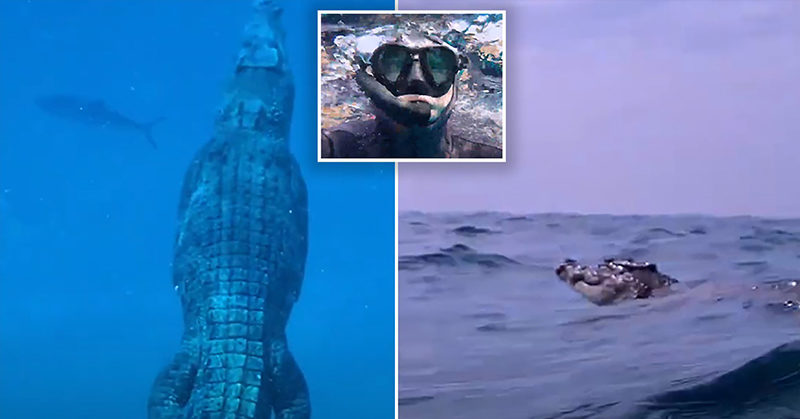A diver in Australia caught on camera one of the most frightening yet incredible experiences of his life: Swimming in the ocean with a giant crocodile.
Man Swims With Giant Crocodile
On October 26th, Chris Burnham went on a routine free dive with some other diver friends off the coast of Arnhem Land in the Northern Territory of Australia. He was swimming along when one of the other divers shouted out “Croc!”. (1)
Burnham looked down only to see a giant crocodile swimming directly below him. He whipped out his camera to capture the stunning animal on video. (1)
“This encounter was as good as they come, the scariest part was swimming past it without seeing it, only to have Mitch scream “croc” soon after he rolled out of the boat, noticing it on the bottom after the bubbles cleared from his mask.” Burnham recalls. (1)
He explained that living and diving in Arnhem for eight years without bumping into a crocodile made him a touch complacent towards the risk of ‘swimming’ into one on a dive. This experience, though not life-threatening in any way, certainly was a bit of a reminder for him. (1)
Up Close and Personal
The group, all highly experienced divers, monitored the giant crocodile for about six minutes before deciding that it was safe enough to move closer. They then swam with the gorgeous animal for about 20 minutes. At the end of the video, you can see the crocodile swim up to the surface only a few meters away from Burnham and the rest. (1)
The divers share a cumulative 50 years of experience with crocodiles between them, so the group understood the animal’s body language and felt relatively safe. Burnham doesn’t suggest that people should go out and actually try to swim with these animals on purpose. (1)
“I by no means condone swimming with crocodiles,” he stated. (1)
Don’t Mess With Giant Crocodiles
A study done in 2013 by Charles Darwin University in the Northern Territory of Australia found that saltwater crocodiles – like the one filmed by Burham – are the world’s most aggressive crocodile. Known in Australia as “salties”, researchers monitored juvenile crocodiles for two years. In comparison to other species, the saltwater crocs demonstrated much more aggression and desire to fight than any of the others. (2)
That being said, despite their aggressive nature they do not patrol the beaches and oceans hunting for humans. Crocodiles of all species are opportunistic predators, meaning that if they are hungry and you happen to be there, you are just as easily a target as any other fish, bird, or mammal. (3)
Fatal crocodile attacks on humans are actually far more common than shark attacks. Unfortunately, many of these attacks happen in small communities in Africa and therefore aren’t reported on in mainstream media. (3)
Though not much is known still on crocodile attack patterns, we do know they are most common (3):
- During periods of rainfall
- When it is warmer or when the temperature increases
- During mating season
Most attacks are feeding related, meaning if the animal is hungry and you are there, it will attack. (3)
Read: A 400-Year-Old Shark Found In The Arctic Could Be The Oldest Vertebrate On Earth
How To Avoid A Crocodile Attack
It is best practice to stay three meters back from rivers and other bodies of water where crocodiles live. Crocodiles can stay underwater for up to an hour, so just because you can’t see them does not mean they aren’t there. (3)
If you do need to cross a river that contains crocs, it is best practice to do so as quietly and with as little splashing as possible. Lots of movement and splashing will attract the animal to you, not scare it away. (3)
If one does grab you, you can try to poke its eyes, hit it on the nose, or shove something down its throat so that it will gag and release you. These may or may not be effective. (3)
All of this being said, most crocodiles, other than saltwater and Nile crocodiles, will attack people. Most are quite wary of us and will only bite if they feel threatened or surprised. (3)
They Still Need Protection
While attacks are devastating and often fatal, these animals still require protection (even giant crocodiles). They are an important part of the ecosystems in which they live. Whether due to revenge attacks or habitat loss and climate change, more education on these animals is needed to protect their populations from dwindling away to nothing. (3)
Keep Reading: When Animals Fight Back, The Hunters Become The Hunted.

